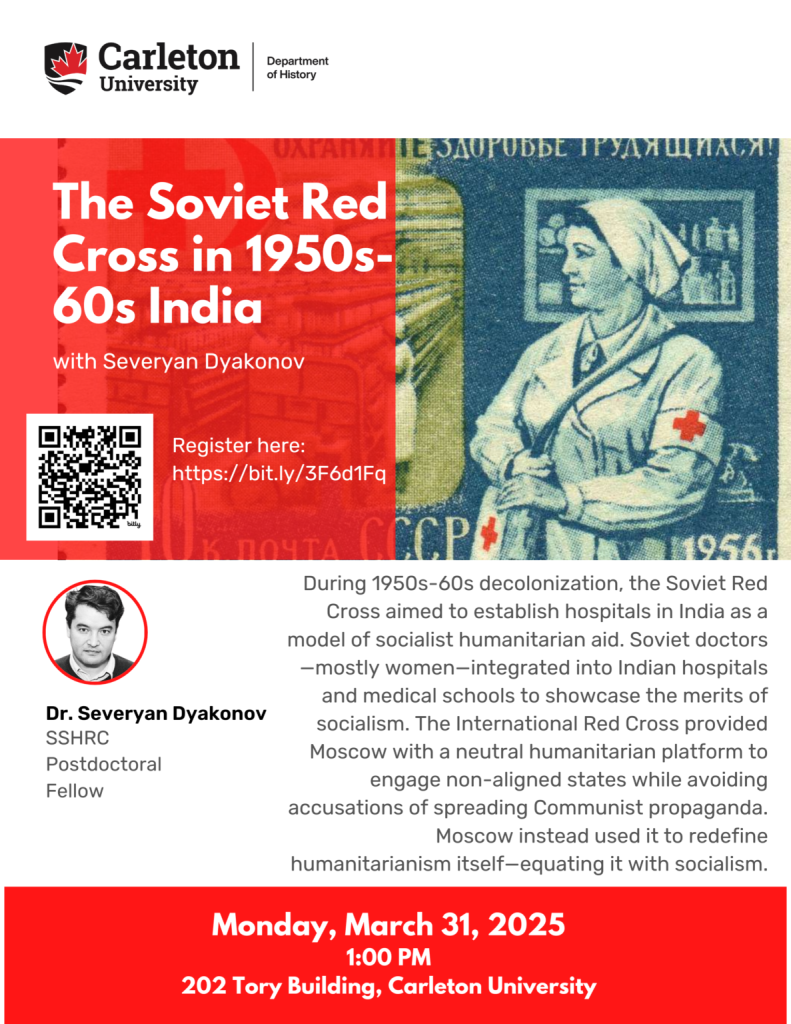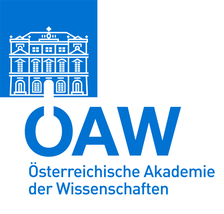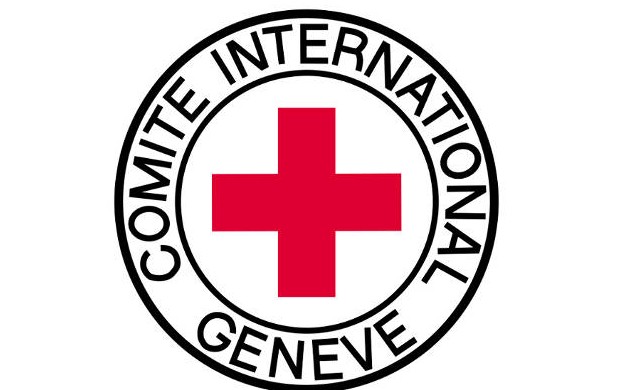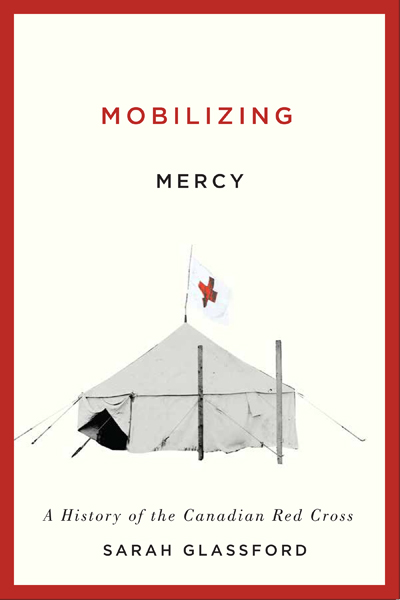
Credit: Dominique Marshall
Severyan Dyakonov is a SSHRC postdoctoral fellow at the Department of History of Carleton University, supervised by Erica Fraser. He is currently in the third year of a research project on the history of the Soviet Red Cross within the broader International Red Cross movement after the Second World War. In this blog entry he wants to briefly talk about themes he is working on and future plans. His current project is part of a long-term commitment to understanding how Cold War dynamics shaped global humanitarianism and public health, particularly within the League of Red Cross Societies (LRCS).
Founded after World War I, the LRCS was created to coordinate the work of national Red Cross and Red Crescent societies around the world. In the aftermath of WWII, the organization—like the United Nations and other major international bodies—underwent a profound transformation due to decolonization. As newly independent nations in Asia and Africa established their own national Red Cross or Red Crescent societies, they joined the League in significant numbers. While there were just over 60 member societies in the 1940s, by the 1970s this figure had doubled to more than 120.
For many of these new states, having a national Red Cross or Red Crescent society served as a marker of sovereignty and international legitimacy. This context also helps explain why the Eastern Bloc, led by the Soviet Union, sought active participation in the Red Cross movement. It offered a valuable platform for engaging with the decolonizing world and promoting alternative models of humanitarianism grounded in socialist ideals.
The Red Cross movement became a key arena for debates over the very meaning of humanitarianism during the Cold War. Socialist countries challenged the dominant philanthropic model, which prioritized emergency aid, and instead advocated for a more developmental approach that emphasized long-term structural transformation. They argued that true humanitarianism required mobilization toward development goals, particularly in newly decolonized nations.
In contrast, Western actors insisted on the neutrality and apolitical nature of humanitarian work, often accusing socialist countries of politicizing the movement. From the perspective of left-leaning thinkers, however, claims of neutrality were often viewed with suspicion—interpreted as tacit alignment with conservative or right-wing ideologies. In the socialist world, humanitarianism was inseparable from the political goal of empowering the decolonizing world to develop independently of former colonial powers. It was not merely about relief, but about supporting a new world order rooted in equality and self-determination.
As part of my research, I examine how Cold War tensions shaped the international humanitarian field by tracing debates within the League of Red Cross Societies. I rely on archival materials from the LRCS, held in Geneva, as well as documents from national Red Cross societies. My first article from this project, titled “‘Resilience, Perseverance, and Sense of Diplomacy:’ The Soviet Red Cross in India, 1954–1963”, has been accepted for publication in the European Journal for the History of Medicine and Health and is expected to appear later this year. I had a chance to present it at Carleton in March. In Ottawa, I conduct research at Library and Archives Canada and draw on Carleton University Library’s Special Collections to examine the role of the Canadian Red Cross and its involvement in Cold War humanitarian dynamics. John MacAuley, originally chair of the Manitoba branch of the Canadian Red Cross, served as president of the Canadian Red Cross and then of the League of Red Cross Societies from 1959 to 1965. Operating from his office in Winnipeg, he led the organization during a pivotal period marked by decolonization and a significant expansion of the League’s membership. You can watch a video of him visiting the LRCS office in Geneva here and also find lots of other Red Cross related documentaries and reels on the International Federation of the Red Cross historical films collection YouTune resource.
Carleton University holds the archival collection of the Ukrainian Red Cross in Exile (URCE), an organization headquartered in Geneva between 1939 and the early 1950s. Although the International Committee of the Red Cross (ICRC) did not formally recognize the URCE, archival evidence suggests that informal relations existed between the two bodies. The URCE’s historical position is particularly intriguing. During World War II, when Ukraine was under Nazi occupation, it was the Soviet Red Cross that found itself effectively in exile from Ukrainian territory. Meanwhile, the URCE served as a hub for correspondence between the Ukrainian diaspora—such as communities in Brazil—and Ukrainians residing in Nazi-occupied parts of Europe.
In March of this year, I helped organize a seminar at the newly established Center for Digital Humanities and Multilateralism in Geneva. The event brought together scholars and practitioners to discuss the future of Red Cross–related archival research in the digital age. Among the participants were Grant Mitchell, Head of Archives at the International Federation of the Red Cross (LRCS before 1991), and Professor Jean-François Fayet, historian at the University of Fribourg. Together, we explored strategies for the digitization and integration of Red Cross–related archival materials, which are currently dispersed across institutions and countries. I hope the seminar will be helpful to fostering collaborative frameworks for improving global access to humanitarian archives.
Looking ahead, I plan to apply for additional funding to continue developing this project. My aim is twofold: to produce further scholarly output and to build a digital database supported by AI-powered research assistance. This platform would help facilitate research in the history of humanitarianism by making archival materials more accessible and searchable for scholars working across disciplines and geographic areas.
Last but not least, my interest in the theme of humanitarianism extends beyond historical research into current global developments. This spring, I recorded a 55-minute podcast with Dr. Yipeng Ge, a Canadian physician who was suspended from his university program after publicly expressing antiwar views on the conflict in Gaza. Although the suspension was later revoked, Dr. Ge chose not to return and instead joined a humanitarian mission to Gaza. The podcast is available on YouTube and Spotify.
I will be happy to find other researchers that work on similar themes and interested in discussing collaborative research funding options. One of them is the European Research Council Horizon Europe Pillar 2 scheme (cluster 2 Culture, Creativity and Inclusive Society) that Canada joined last year. You can reach me out on LinkedIn, Bluesky, and by emailing me:
Link for my talk at Carleton:
The Soviet Red Cross in 1950s-60s India-Talk. – Canadian Network on Humanitarian History
Link for event on digital humanities’ seminar:
Link to YouTube video with John MacAuley visiting the LRCS in Geneva:
Link to IFRC archives’ film collection:
IFRC Film Archives Digitization Project (2021)
Yipeng Ge interview on YouTube:
Interview with Yipeng Ge — Canadian Doctor Who Went to Gaza on Humanitarian Mission.
On Spotify:
ERC Horizon Europe how to apply link:








